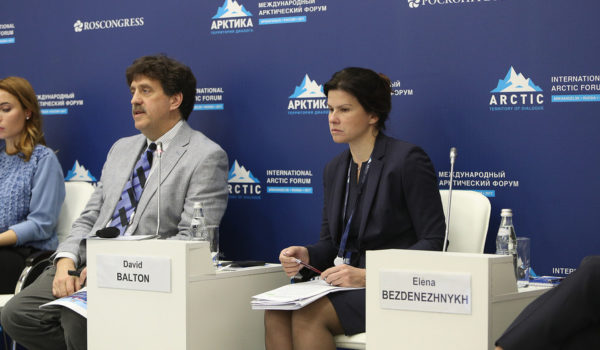Elena Bezdenezhnykh: “Environmental protection is one of our key business missions”

The ‘Arctic: Territory of Dialogue’ International Arctic Forum opened on March 29 in Arkhangelsk. A welcome address by Dmitry Rogozin, Chairman of the State Commission for Arctic Development, kicked off discussions of the Arctic agenda. Environmental safety in the Arctic was one of the key topics of the first day of the Forum at the ‘Arctic: Territory of Ecology’ session.
Maria Morgun, Editor-in-Chief, Live Planet TV; Anchor, Correspondent, Russia Television and Radio, moderated the session.
Key speakers included:
- Murad Kerimov, Deputy Minister of Natural Resources and Environment of the Russian Federation
- David Balton, Chair of the Senior Arctic Officials, Arctic Council
- Erik Solheim, Executive Director, the United Nations Environment Program (UNEP)
- Elena Bezdenezhnykh, Vice-President – State Secretary, GR, Norilsk Nickel
- Dmitry Kobylkin, Governor, Yamalo-Nenets Autonomous District.
Russian and international government officials and representatives of government organizations, state-owned and private companies, and international public foundations took part in the discussion. The session was attended by Hannele Pokka, Permanent Secretary, Ministry of Environment of the Republic of Finland, Liisa Rohweder, Secretary General, World Wide Fund for Nature (WWF) Finland, and Stefan Flückiger, Ambassador, Swiss Federal Department of Foreign Affairs; Coordinator of Swiss Arctic and Science Policy.
The agenda included the following issues: Preserving biodiversity in the Arctic, international environmental obligations of the Arctic states, predicting and preventing potential environmental damage caused by economic activity, and standards for corporate environmental responsibility in the Arctic.
Deputy Minister of Natural Resources and Environment of the Russian Federation Murad Kerimov said that the Arctic has historically been a strategically important region for Russia. In 2008 the Russian President approved a state policy framework for the Arctic and in 2013 the Chairman of the Government adopted a strategy for the development of the Arctic area. Kerimov pointed out the preservation of the area’s unique ecosystem as one of the key objectives. “One of our priorities is to establish and develop an efficient waste management system. With the exception of the Arkhangelsk Region, territorial waste management schemes have been approved for the Arctic area. The Murmansk Region and the Krasnoyarsk Territory are among our pilot projects: They will transition to this system as soon as by the end of 2017”, Kerimov said.
Elena Bezdenezhnykh, Vice-President – State Secretary, GR, Norilsk Nickel, said that between 2014 and 2016 Norilsk Nickel spent around USD 1 billion to improve the environmental situation in the regions where the company operates. “Even before the Year of Ecology was inaugurated, our company had concluded that environmental protection was one of our key business areas. This has been included in the company’s development strategy until 2023. Our total environmental spending will exceed USD 250 billion”, Elena Bezdenezhnykh said. “Last year Norilsk Nickel shut down the oldest metals plant in our region, the Nickel Plant, improving environmental conditions there by 35%. Production facility upgrades that we are making following the plant’s closure have given us an impetus for developing more environmental measures. We will invest more than a trillion roubles by the year 2023”.
Yamalo-Nenets Autonomous District Governor Dmitry Kobylkin also noted that active industrial development is underpinned by the environmental safety of all processes, which is crucial for preserving the fragile nature of the North and safeguarding the interests of its indigenous people. “Yamal is home to 43,000 of them, which is a matter of special pride for us. Indigenous populations that lead a traditional way of life have grown 12% over the past decade. Much is being done to eliminate the damage that has been done, and we have been cleaning up our territory. Our Autonomous District’s government together with oil and gas companies completed a thorough cleanup on Beliy Island. Some 70 hectares have been cleaned up and 1,200,000 tonnes of scrap metal collected. Today, the island is a stationary base for scientific research”, the governor said.
David Balton, Chair of the Senior Arctic Officials of the Arctic Council, spoke about an important shift taking place in the Arctic today – ice receding in the Arctic Ocean. “This is bad news for anyone living in the Arctic area. Climate change may affect the entire world, but in the Arctic it is opening up new opportunities for transportation of goods, hydrocarbon development, and tourism. The Arctic Council will be looking into all those opportunities”, David Balton said.
The panellists expressed hope for continued intergovernmental cooperation on preservation and protection of the natural environment of the Arctic, a land of unique natural ecosystems, landscapes and complexes.

